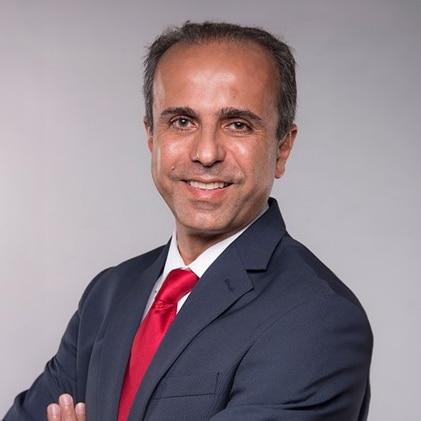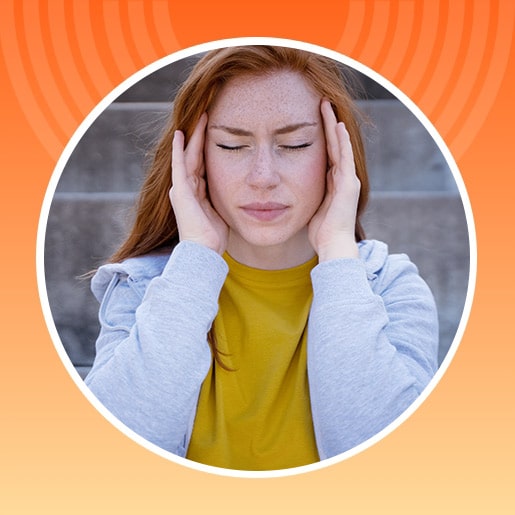
Dr. Ali Danesh
Tinnitus and Hyperacusis Expert and Scientist
About Tinnitus
Tinnitus is the perception of hearing noise, or ringing in the ears, without any external source. There are approximately 50 million people in the United States who have reported symptoms of tinnitus. While virtually everyone experiences at least one episode of tinnitus in their lifetime, many people experience its symptoms daily to the degree that it disturbs activities and sleeping patterns.
Tinnitus is manageable and help is possible. While there is no one quick fix to this dilemma, several options are available to help stop ringing in the ears. The precise origin of tinnitus is still being explored, however, there are several factors that contribute to ringing in the ears.
Common Causes:
- Loud noise exposure
- Ototoxic medications
- Head trauma
- Hearing loss
- Thyroid malfunction
- Diabetes
- Meniere’s Disease
- Otosclerosis
- Acoustic Neurinoma
- Vitamin Deficiencies
- Middle ear infections
Exacerbating Factors:
- Anxiety
- Depression
- Fatigue
- Stress

Tinnitus Management
At Labyrinth Audiology, we provide sophisticated and multidisciplinary treatment and management options for patients with tinnitus. As part of our treatment services, we offer:
- Comprehensive Tinnitus Evaluation (may include tests for hyperacusis and misophonia)
- Tinnitus Counseling, Modified Cognitive Behavioral Therapy and Sound Therapy, Internet-based Cognitive Behavioral Therapy (iCBT)
- Multidisciplinary Team Treatment
- Supplemental and Nutritional Tinnitus Advice
- Tinnitus Habituation, Activity & Retraining Therapy
- Acoustically Engineered Custom-made Sound Therapy Applications
- Neuromonics, Desyncra & Neuromodulation Tinnitus Treatments

After a case history, we will have you answer some questionnaires for us to better understand how tinnitus affects your life. While we employ routine audiological testing to assess your hearing sensitivity, we also attempt to understand the characteristics of your tinnitus. Additionally, we use psychoacoustical and electrophysiological measurements. Such tests will provide more detail as to the type of sounds you may be perceiving, and how we can go about assisting you in effectively managing the annoyance.
Solutions to tinnitus are achievable. Strategies ranging from counseling and cognitive-behavioral therapy to the use of special instruments and supplements can work toward our goal of combating tinnitus. Using scientific and clinically proven evidence-based approaches, our team of tinnitus specialists will design a therapeutic model for your tinnitus management which will help you to achieve control over your tinnitus.
Our professionals are experts in decreased sound tolerance disorders such as hyperacusis and misophonia. Many of those who suffer from tinnitus may also have decreased sound tolerance disorders. Our management plan will address both conditions.

Tinnitus and Cognitive
Behavioral Therapy
Dr. Ali Danesh and Labyrinth Audiology are pleased to inform you that we now offer cognitive-behavioral therapy (CBT) for treating patients with persistent, bothersome tinnitus. By implementing CBT as a critical component of our tinnitus treatment, we utilize evidence-based treatment for tinnitus.
Evidence-based therapies are shown through research to reduce symptoms such as depression, anxiety, and fear. CBT, delivered within a context of a caring, therapeutic relationship provided by a qualified counselor provides an effective basis for treatment. In addition to assisting patients, family members or significant others may receive counseling as an adjunct to patient treatment. Telemedicine will also be available to provide ongoing support and follow-up for patients needing “booster” sessions.
Recent Tinnitus & Hyperacusis Articles
Written by Dr. Danesh and Colleagues
- Psychometric Evaluation of the Hyperacusis Impact Questionnaire (HIQ) and Sound Sensitivity Symptoms Questionnaire (SSSQ)
Aazh H, Hayes C, Moore BCJ, Danesh AA, Vitoratou S. (2022). Psychometric Evaluation of the Hyperacusis Impact Questionnaire (HIQ) and Sound Sensitivity Symptoms Questionnaire (SSSQ) Using a Clinical Population of Adult Patients with Tinnitus Alone or Combined with Hyperacusis. J Am Acad Audiol. 2022 Feb 23. doi: 10.1055/a-1780-4002. Epub ahead of print. PMID: 35196727.
- Hyperacusis in Autism Spectrum Disorders
Danesh AA, Howery S, Aazh H, Kaf W, Eshraghi AA (2021).Hyperacusis in Autism Spectrum Disorders. Audiology Research, 11(4):547-556.
- Self-reported Tinnitus Severity Prior to and During the COVID-19 Lockdown in the UK
Aazh H, Danesh AA, Moore BCJ (2021). Self-reported Tinnitus Severity Prior to and During the COVID-19 Lockdown in the UK. J Am Acad Audiol. 2021 Oct;32(9):562-566. doi: 10.1055/s-0041-1731733. Epub 2022 Feb 17.
- Trilogy of Papers: Audiologist-Delivered Cognitive Behavioral Therapy for Tinnitus and Hyperacusis
Aazh H, Danesh AA (2021).ONLINE FEATURE | Trilogy of Papers: Audiologist-Delivered Cognitive Behavioral Therapy for Tinnitus and Hyperacusis. Audiology Today, March-April Online Issue.
- Internet-based Cognitive Behavioral Therapy for Tinnitus
Aazh, H & Danesh, AA (2020).Internet-based Cognitive Behavioral Therapy for Tinnitus: Insights from Health Care Professionals. The Hearing Journal. First published online Wednesday, December 30, 2020 Internet-based Cognitive Behavioral Therapy for Tinnitus: In… : The Hearing Journal
- Internal Consistency and Convergent Validity of the Inventory of Hyperacusis Symptoms
Aazh H, Danesh AA, Moore BCJ. Internal Consistency and Convergent Validity of the Inventory of Hyperacusis Symptoms. Ear Hear. 2020 Nov 30. doi: 10.1097/AUD.0000000000000982. Epub ahead of print. PMID: 33259445.
- Tinnitus and Insomnia: Management via Audiologist-Delivered CBT
Aazh, H & Danesh, AA (2020). Tinnitus and Insomnia, The Hearing Journal: June 2020 – Volume 73 – Issue 6 – p 14,15.
- Misophonia: A Neurologic, Psychologic, and Audiologic Complex
Danesh, AA & Aazh, H (2020).Misophonia: A Neurologic, Psychologic, and Audiologic Complex. The Hearing Journal. Vol 73, pp20-23.
- Cognitive Behavioral Therapy For Alleviating The Distress Caused By Tinnitus, Hyperacusis And Misophonia: Current Perspectives
Aazh, H., Landgrebe, M., Danesh, AA & Moore, BCJ.Cognitive Behavioral Therapy For Alleviating The Distress Caused By Tinnitus, Hyperacusis And Misophonia: Current Perspectives. Psychol Res Behav Manag. 2019 Oct 23;12:991-1002
- Incorporating Tinnitus Management Services into your Audiology Practice
Danesh, AA (2019).Incorporating Tinnitus Management Services into your Audiology Practice. The Hearing Journal. Vol 72, pp22-23.
- Parental mental illness in childhood as a risk factor for suicidal and self-harm ideations in adults seeking help for tinnitus and/or hyperacusis
Aazh, H., Landgrebe, M & Danesh, AA. (2019).Parental mental illness in childhood as a risk factor for suicidal and self-harm ideations in adults seeking help for tinnitus and/or hyperacusis. Am J Aud.
- Misophonia: Awareness and Responsiveness Among Academics
Porcaro, C.K., Alavi, E., Gollery, T., & Danesh, A.A. (2019).Misophonia: Awareness and Responsiveness Among Academics. Journal of Postsecondary Education and Disability, 108-118, 32 (2).
- Parental separation and parental mental health in childhood and tinnitus and hyperacusis disability in adulthood: a retrospective exploratory analysis
Aazh, H., Langguth, B. & Danesh, AA (2018).Parental separation and parental mental health in childhood and tinnitus and hyperacusis disability in adulthood: a retrospective exploratory analysis. Int J of Aud. 2018 Oct 1:1-6. doi: 10.1080/14992027.2018.1514470.
- Parental mental health in childhood as a risk factor for anxiety and depression among people seeking help for tinnitus and hyperacusis
Aazh, H., Danesh, AA & Moore, BCJ (2018).Parental mental health in childhood as a risk factor for anxiety and depression among people seeking help for tinnitus and hyperacusis. J of Am Acad Aud.
- Insights from the Third International Conference on Hyperacusis: Causes, Evaluation, Diagnosis, and Treatment
Aazh H, Knipper M, Danesh AA, Cavanna AE, Andersson L, Paulin J, Schecklmann M, Heinonen-Guzejev M, & Moore BCJ (2018).Insights from the Third International Conference on Hyperacusis: Causes, Evaluation, Diagnosis, and Treatment. Noise Health. 2018 Jul-Aug ;20(95):162-170.
- Central Auditory Processing Disorders in Individuals with Autism Spectrum Disorders
Ocak, M, Eshraghi, R, Danesh, AA, Mittal, R & Eshraghi E (2018).Central Auditory Processing Disorders in Individuals with Autism Spectrum Disorders. Balkan Medical Journal, June 2018.
- The Audiology of Otosclerosis
Danesh, AA, Shahnaz, N, & Hall, JW (2018).The Audiology of Otosclerosis. Otolaryngol Clin North Am. 2018 Apr; 51(2):327-342.
- Hyperacusis and its Management
Danesh, AA (2019).Hyperacusis and its Management.
- Psychometric Evaluation of the Hyperacusis Impact Questionnaire (HIQ) and Sound Sensitivity Symptoms Questionnaire (SSSQ)
